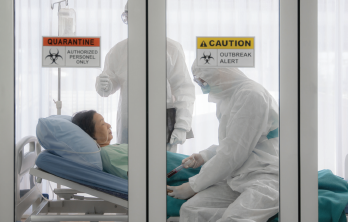
Mongkolchon Akesin / shutterstock.com
Some have opined, cynically, that transformative changes will not come to medical education and training, and to healthcare, until pigs fly. Well, in 2009–10, “swine flu,” and now we are in the midst of an unprecedented and disruptive pandemic, affecting virtually all aspects of our lives, including fellowships.1
As someone who started a rheumatology fellowship in July, permit me to share some of my thoughts.
March 15
I am in my last months of medicine residency at the beginning of the coronavirus pandemic. I am on the team caring for the first patients with COVID-19 in my hospital in Westchester County, N.Y. They are from a nearby nursing home, and we know many more will follow. I am placed in quarantine. From home, I help triage resident physicians, fellows, support staff and nurses who were all exposed to my patient. We don’t know how sick others may become.
I call my husband, who is completing ophthalmology training 300 miles away. He tells me he does not have any symptoms.
I breathe a sigh of relief, but still worry.
April 6
Respirator masks, face shields and an armor of personal protective equipment are the new normal. Medicine residents are pulled from clinics to cover intensive care units. Didactics are canceled. Patients are alone, visitors not allowed, and interactions with family members have been reduced to plasma screens.
I call my husband. It is raining in Eastern Pennsylvania. I worry.
The world is dark.
April 17
It is 3:18 a.m. My heart is broken as I stand with the cardiac resuscitation team after multiple failed attempts to bring life back to a patient suffering complications of COVID-19. He was 42 years old; his only comorbidity was obesity. His death was sudden. I tell his mother the news, and we cry together.
May–June
Many of my peers—residents and fellow
physicians—are sick. Some struggle to simultaneously care for their family members. Several attending physicians have been hospitalized for complications of COVID-19. One attending physician passed away. People are dying. I feel helpless.
June 30
I call my husband on the last day of residency. He remains well. I still worry.
I don’t know what the next phase of my professional life—rheumatology fellowship—will bring. Medicine has been a matter of life and death on a day-to-day basis. What will it be like in rheumatology? What will education, training and patient care look like during the pandemic? How will I matter and make a difference for my patients?
July 2
It is my first day of fellowship, and my first patient walks into clinic. Mr. H is 26 years old, but looks 17. He is alone. He has a history of knee swelling and recurrent effusions. Then he developed skin changes—itchy red and white flakes all over his scalp. He was sent to the rheumatology division by his knee surgeon for further evaluation. The diagnosis was clear. We spent most of the visit explaining the implications of psoriatic arthritis. We were going to start methotrexate. The side effects include infections.
I pause.
I think about the past five months confronting COVID-19. It is a strange time. Restaurants are closed. Friends distanced. Jobs lost. The world is polarized, political and ugly. The discussion of starting an immunosuppressant medication feels portentous. I want to say the right thing. I tell him what I can—that current guidelines recommend we start treatment for his disease and monitor him closely in this anomalous time.2 I ask, with all this in mind, if he will take this medication.
He tells me he loves the beach. Before COVID-19, he had begun seeing a new girlfriend, but when he took her to the sand and rocks, the uneven terrain irritated his swollen knee. He asks if he will be able to walk at the waterfront again. I relate that the medication should help his knees. As Mr. H leaves the clinic, I think of the past few months, which emphasized that nothing is guaranteed and nothing should be taken for granted.
July 15
I call my husband, now 2,650 miles away, worried still, to tell him about my rheumatology fellowship.
I participate in weekly didactics. Like so much else, these too are altered by the pandemic. What was once a bustling room of engaged faculty, fellows, residents and students is now a Zoom meeting. National rheumatology conferences and key networking opportunities are now online lectures. I listen, I read, and I learn, but I miss the robust interpersonal engagement of prior times.
The majority of my outpatient clinic encounters consist of a telephone and a computer. I call patients with an interpreter on the telephone line and conduct my exam through a series of questions. I hope I am not missing something key that would be apparent on physical exam. Often, I lose the connection in the middle of the call. Other times, we cannot reach the patient. Many patients are afraid to visit the clinic for tests and imaging. There is something fundamentally missing, and we all know it.3
Aug. 20
I am in the clinic and a nurse comes into my room. She tells me that Mr. H is in the waiting room and hoping to be seen. He could not tolerate his medications. His knees are worse. The words feel heavy as she says them. I wonder if I have let him down. I walk into the waiting room. Mr. H tells me about his symptoms of severe nausea and vomiting after taking methotrexate, and then about his worsening knee pain. He states that he did not know how to call.
I pause.
I think of what this experience must be like for this young man, alone in doctors’ offices, having undergone multiple procedures, and still not feeling better. He is scared and wants nothing more than to be healthy and to walk comfortably again. I speak with Mr. H about his concerns, and together we develop a plan. I am confident he will return improved.
Aug. 30
I have come to appreciate that I have begun fellowship training at a time of dramatic, historic turbulence and transformative change. COVID-19 confounds the expectations for fellowship training set forth by the Accreditation Council for Graduate Medical Education.4,5 Clinical trials are on hold. Board examinations are postponed. Methods of evaluating fellows are strained. Milestones cannot be met. Yet we adapt and persevere and, hopefully, will emerge better and stronger.
Education, training and patient care in rheumatology—indeed throughout medicine—will never be the same. Our field, though, is special. We have, I think, a set of values and an identity that endure and will sustain us during the pandemic.3,5-7 It takes an unusual disposition and perspective to serve our patients.
We offer to share in the predicament of others. We seek wisdom when certainty is elusive. We cultivate patience, humanity, empathy, altruism and tolerance of uncertainty. We aspire to be knowledgeable, thoughtful, responsive, ethical and compassionate in today’s complex world. We accept realities and prepare for and adjust to tomorrow’s changes. We attempt to preserve the best of our traditions and to develop new strengths to successfully meet the future. We never lose sight of our categorical responsibility to do the right thing and to care well for our patients.
Rheumatologists are drawn to this cognitive-based specialty because of the intellectual challenges. The good rheumatologist models a scholarly, humanistic approach to medicine. But the good rheumatologist also appreciates that rheumatology at the bedside remains inherently a clinical exercise, that good medicine uses science to inform art and art to inform science. Rheumatologists love the immediacy of our specialty, the ability to understand by talking to and touching patients. Rheumatologists take special pride in knowing our refined clinical skills remain indispensable.7 For these reasons, rheumatologists perhaps are uniquely suited to play a leadership role as medicine evolves in response to COVID-19.
Aug. 31
I call my husband. He is still well. We know we are lucky. I tell him that although I continue to worry about his and my own well-being, my choice of fellowship is validated. I am truly enjoying the challenges of learning and doing rheumatology despite the disrupting effects of the pandemic.
 Nicole K. Zagelbaum Ward, DO, MPH, is a rheumatology fellow at the Keck School of Medicine, University of Southern California, Los Angeles. She is interested in pursuing an academic career, and her research interests include medical disparities, gender disparities and health service research.
Nicole K. Zagelbaum Ward, DO, MPH, is a rheumatology fellow at the Keck School of Medicine, University of Southern California, Los Angeles. She is interested in pursuing an academic career, and her research interests include medical disparities, gender disparities and health service research.
 Richard S. Panush, MD, MACP, MACR, is a professor of medicine in the Division of Rheumatology, Department of Medicine, Keck School of Medicine, University of Southern California.
Richard S. Panush, MD, MACP, MACR, is a professor of medicine in the Division of Rheumatology, Department of Medicine, Keck School of Medicine, University of Southern California.
References
- 1anush RS. Privilege and principle: Gifts and industry relationships revisited. Nature Rev Rheumatol. 2009 Aug;5(8):421–423.
- Mikuls TR, Johnson SR, Fraenkel L, et al: American College of Rheumatology guidance for the management of adult patients with rheumatic disease during the COVID-19 pandemic: Version 1. Arthritis Rheumatol. 2020 Apr 29 [online ahead of print].
- Panush RS, Neelon FA. Out of touch in the time of COVID-19: tele-supervising tele-visits during a pandemic. The Pharos. 2020;83(3):30–34.
- Criscione-Schreiber LG, Brown CR Jr., O’Rourke KS, et al. New roadmap for the journey from internist to rheumatologist. Arthritis Care Res (Hoboken). 2017 Jun;69(6):769–775.
- Panush RS: Rheum with a view. How should we train rheumatology fellows today for tomorrow? The Rheumatologist. 2013 Aug;7(8):32–33.
- Zagelbaum NK. Perspective. J Med Humanit. 2017 Dec;38(4):503–504.
- Panush RS: Rheum with a view. Why rheumatology and the care of patients with rheumatic disease are important, interesting, and fun. The Rheumatologist. 2011 Jun;5(6):65–68, 70–72.


